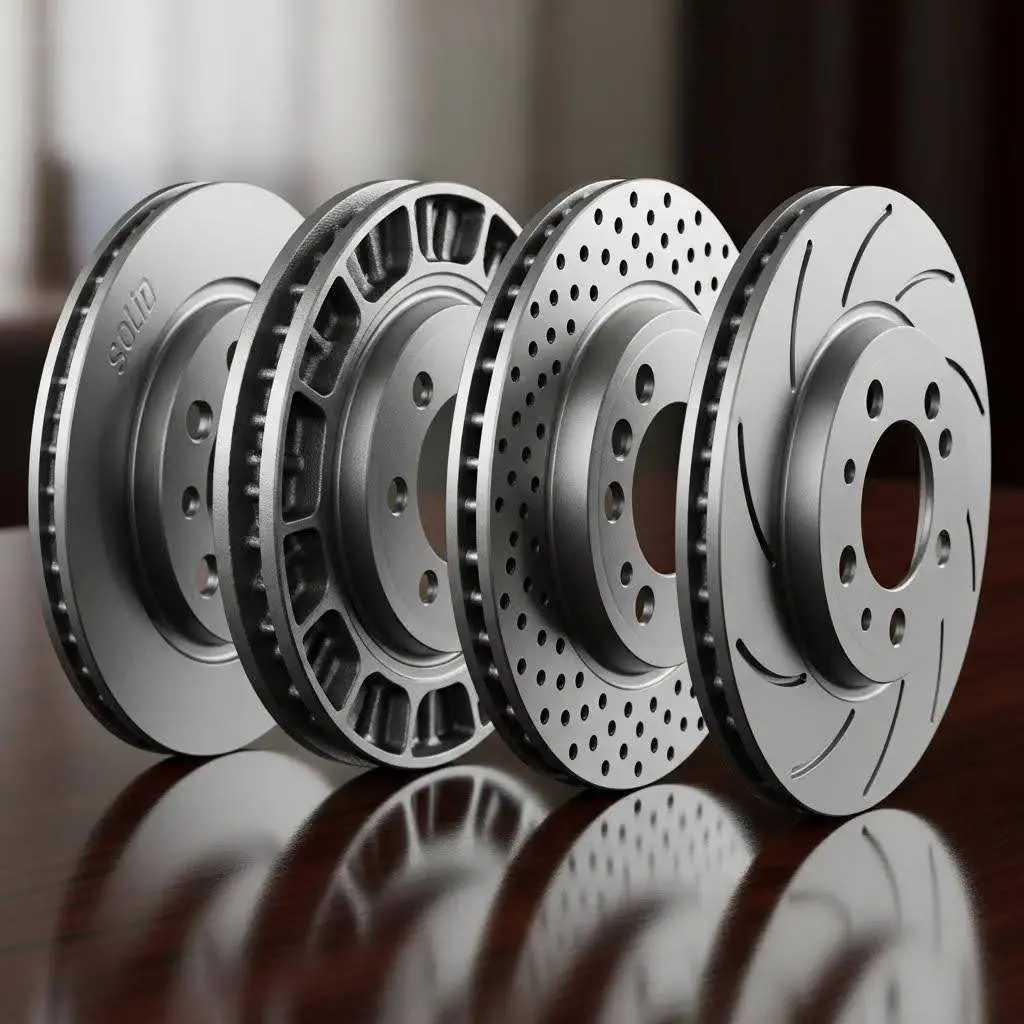Wondering what the difference is between summer, winter, and all-season tyres? Summer tyres excel in warm weather, winter tyres are ideal for snow and ice, and all-season tyres offer versatility for moderate conditions. This guide will explain these differences in detail.
Key Takeaways
- For expert tyre service, a wide selection of tyres, and fast, reliable fitting services, trust All Vehicle Services in Sittingbourne to keep you safe on the road.
- Summer tyres are optimised for warm weather, ensuring superior handling and fuel efficiency, but lack performance in colder conditions.
- Winter tyres provide essential traction and control on snowy and icy roads, featuring specialised tread patterns that prevent skidding.
- All-season tyres offer a versatile, year-round option but may not perform as effectively in extreme summer or winter conditions compared to dedicated tyre types.
Understanding Summer Tyres
Summer tyres are designed for optimal performance in warm weather and dry conditions. They feature a unique tread pattern that minimises rolling resistance, enhancing vehicle acceleration and fuel efficiency.
This makes summer tyres an excellent choice for the hot summer months when roads are dry and temperatures are high. Additionally, a summer tyre is essential for maximising performance during these conditions.
The specialised rubber compounds in summer tyres provide responsive handling and braking on both wet and dry surfaces. This ensures that your vehicle maintains excellent grip and control even in sudden summer showers.
The performance of summer tyres diminishes significantly when temperatures drop below 7°C, as the softer compound hardens, reducing traction and increasing the risk of skidding, which can lead to short braking distances.
Moreover, summer tyres excel in providing a smooth and quiet ride, thanks to their optimised tread design. Brands like Michelin Pilot Sport 5 exemplify the great performance these tyres can offer in warm weather conditions. However, their performance is limited to the summer months, making them less suitable for winter driving conditions.

Winter Tyres: What Are They?
Winter tyres, often referred to as snow tyres, are your best bet when facing snowy and icy conditions. They are made from a specially formulated rubber compound that remains flexible in colder temperatures, ensuring better traction and control on packed snow.
This flexibility is crucial when temperatures plummet, allowing the winter tyre to maintain grip on slippery surfaces.
The unique tread pattern of winter tyres features larger grooves and sipes, which are essential for improved traction on snow and ice.
As you drive, snow compacts into these deep grooves, utilising shear forces to provide additional grip on snowy roads. This design significantly reduces the risk of skidding and enhances overall vehicle control during winter driving.
Winter tyres, like the Michelin Alpin 7, are specifically designed to offer superior safety in harsh winter conditions. They are not just about surviving wintery conditions but thriving in them, ensuring you can navigate winter roads with confidence and safety.
What Are All-Season Tyres?
All-season tyres are designed to be versatile solutions, performing adequately in both summer and winter conditions. They are often considered a middle ground between summer and winter tyres, making them suitable year-round for drivers who experience mild weather conditions. Additionally, all-weather tyres can also be a practical option for those seeking flexibility.
Modern all-season tyres incorporate advanced technology to challenge the belief that they are merely a compromise. They are equipped to handle various terrains and weather conditions, appealing to diverse driving needs.
However, all-season tyres do not provide the same precision as summer tyres in hot weather or the same level of traction as winter tyres in snowy conditions. While they offer a comfortable ride and can reduce the impact of road imperfections due to their softer rubber compound, their performance may not match dedicated summer or winter tyres in extreme conditions.
Performance Comparison: All Season vs Winter vs Summer Tyres Winter
When comparing summer, winter, and all-season tyres, it’s crucial to consider how each performs under different weather conditions. Summer tyres provide optimal handling and stability on dry and wet surfaces, making them ideal for warm weather conditions.
They excel in both dry and wet conditions during hot weather, offering superior handling and braking compared to all-season alternatives.
Winter tyres, on the other hand, are specifically designed for harsh winter conditions. They offer:
- Superior safety in snow and ice
- Better traction and control on winter roads
- Deep grooves and sipes that are crucial for maintaining grip on icy surfaces, which summer and all-season tyres may struggle with.
All-season tyres combine features of both summer and winter tyres, allowing them to perform adequately in a variety of weather conditions.
However, they may not provide sufficient traction on snow and ice, making them less effective than winter tyres in severe winter weather.
When to Use Each Tyre Type
Choosing the right tyre type is crucial for ensuring optimal performance and safety under varying weather conditions. The decision involves considering factors such as temperature, rainfall, and the presence of snow or ice.

Temperature Considerations
Temperature is a critical factor in tyre performance. Summer tyres are optimised for use in temperatures above 7°C, providing better traction and handling in warm conditions.
When temperatures drop below 7°C, using summer tyres can lead to reduced grip and longer braking distances. In freezing temperatures, the tread compound of summer tyres hardens in cold weather, increasing the risk of skidding. Additionally, temperatures lower than 7°C further exacerbate these issues.
Switching to winter or all-season tyres when temperatures consistently drop below 7°C ensures safety and performance during the colder months, even in relatively mild winters.
Winter tyres remain flexible in cold temperatures, providing better traction on icy roads, while all-season tyres offer a balanced performance in moderate climates.
Rainfall and Wet Roads
Rainfall and wet road conditions require tyres that can effectively handle water dispersion on dry and wet roads. Summer tyres typically have a wider and deeper tread, which enhances their ability to handle wet conditions by allowing for better water dispersion.
This results in superior handling and reduced stopping distances on wet roads compared to all-season tyres.
While designed to perform adequately in light rain, all-season tyres may struggle in heavy downpours, where summer tyres excel. Their tread patterns are designed for better water evacuation, enhancing performance on wet roads.
However, summer tyres might be the better choice for regions with heavy rainfall to ensure safety and control.
Snowy and Icy Conditions
In snowy and icy conditions, winter tyres are indispensable. They are engineered for temperatures below 7°C and feature deeper tread patterns for better traction on ice and snow. In these conditions, winter tyres provide superior traction and handling compared to summer or all-season tyres.
Using winter tyres in snowy conditions greatly reduces the risk of skidding and improves overall vehicle control. For safe winter driving, winter tyres are recommended as they are specifically designed to navigate through snow and ice effectively.
Benefits of Seasonal Tyre Changes
Changing tyres according to the season enhances vehicle performance and safety by ensuring optimal grip and handling in varying weather conditions.
Seasonal tyre changes help improve fuel efficiency, as tyres designed for specific conditions provide better traction and reduce rolling resistance.
Using the right type of tyres for the current weather can prevent premature wear and tear, thus extending the overall lifespan of your tyres. Regularly checking the tread depth of winter tyres is crucial for maintaining their performance and safety in snowy conditions.
Investing in seasonal tyre changes ensures your vehicle is always equipped with the best seasonal tyres for the conditions.

Common Misconceptions About Tyres
One common misconception is that summer tyres can be used year-round. However, using summer tyres in winter can significantly increase braking distances and reduce handling and traction, increasing the risk of accidents.
The tread design of summer tyres is not suited for icy roads, leading to significant reductions in safety and control.
Another myth is that all-season tyres are a compromise and only fit small vehicles. In reality, they are available in a range of sizes suitable for larger vehicles as well. Understanding these misconceptions can help you make better-informed decisions about your tyre choices.
How to Choose the Right Tyres for Your Vehicle
Selecting tyres should align with your typical driving style and vehicle specifications. Aggressive driving may require tyres with better performance characteristics, while a more conservative driving style might benefit from tyres designed for comfort.
Selecting tyres that are compatible with your vehicle’s specifications, as outlined in the owner’s manual, is crucial.
Budget considerations should also include the long-term performance and durability of the tyres. All-season tyres, for instance, offer a cost-effective solution for regions with mild winters by eliminating the need for seasonal changes. However, it’s crucial to weigh the initial cost against the long-term benefits and performance of the tyres.
Lastly, different tyre types can affect the vehicle’s handling and driving experience, requiring some adjustment for the driver. By considering these factors, you can ensure you choose the right tyres for your vehicle, enhancing both safety and performance while providing precise handling.
All Vehicle Services: The Reliable Garage in Sittingbourne for All Your Tyre Needs
When it comes to changing your tyres and ensuring optimal vehicle safety, All Vehicle Services tyres in Sittingbourne is the trusted local expert you can rely on.
With over 10 years of experience, we stock a wide range of summer, winter, and all-season tyres from leading brands like Michelin, Bridgestone, Goodyear, and more to suit every budget and vehicle type.
Our friendly, knowledgeable technicians and mechanics are always ready to help you select the perfect tyres for your driving needs and climate, ensuring you get maximum performance and safety year-round.
We understand the importance of quick and professional service, which is why we offer same-day fitting for most tyres as well as a convenient mobile tyre fitting service that comes to your home, workplace, or roadside 24/7. In addition to our swift service, we also highlight major car service advantages explained by our experienced team. This includes thorough inspections and the use of high-quality parts to ensure your vehicle runs efficiently. Whether you’re in need of routine maintenance or urgent repairs, our expertise guarantees reliability and peace of mind.
Don’t wait until your tyres compromise your safety or comfort. Contact us today at 01795 422040 to book your tyre replacement or consultation.
Why Trust All Vehicle Services?
- Extensive stock of premium, mid-range, and budget tyre brands
- Expert advice on summer, winter, and all-season tyre selection
- Same-day tyre fitting at our Sittingbourne garage and fast mobile fitting service
- Professional technicians with decades of automotive experience
- Competitive pricing and convenient scheduling tailored to your needs
Experience safer, smoother driving all year round with All Vehicle Services. Call us today on 01795 422040.
Frequently Asked Questions
When should I switch from summer tyres to winter tyres?
You should switch to winter tyres when temperatures consistently drop below 7°C to ensure optimal performance and safety on the road.
Can I use all-season tyres year-round?
Yes, all-season tyres can be used year-round, especially in mild climates, as they are designed to perform well in both summer and winter conditions. However, dedicated winter tyres are recommended for optimal safety and performance in severe winter conditions.
What are the benefits of seasonal tyre changes?
Seasonal tyre changes significantly enhance vehicle performance and safety, leading to improved fuel efficiency and a longer lifespan for your tyres. Prioritising this practice ensures optimal handling and traction for the specific road conditions.
Are all weather tyres a compromise?
While modern all-season tyres are designed to perform adequately in a variety of conditions, they may not provide the specialised performance of dedicated summer or winter tyres. Therefore, they can be seen as a compromise in terms of maximising safety and handling in extreme weather.
Conclusion
Choosing the right tyres for your vehicle is essential for ensuring safety and optimal performance. Summer tyres excel in warm weather, winter tyres provide superior traction in snowy and icy conditions, and all-season tyres offer a versatile solution for mild climates. Understanding the differences and knowing when to use each type can significantly enhance your driving experience. In regions where temperatures regularly exceed 7 degrees Celsius, the optimal season for summer tyres is crucial for maximizing grip and handling. It’s important to monitor local weather patterns and conditions, as using the wrong tyre type can lead to decreased performance and increased risk of accidents. By selecting the appropriate tyres based on the season, you not only ensure safety but also prolong the lifespan of your tyres.
Consider the benefits of seasonal tyre changes and debunk common misconceptions to make informed decisions. When in doubt, consult with us at All Vehicle Services. We are here in Sittingbourne to give you the best automotive services. Our team will help you drive safely and confidently, knowing your vehicle is equipped with the best tyres for any condition.


